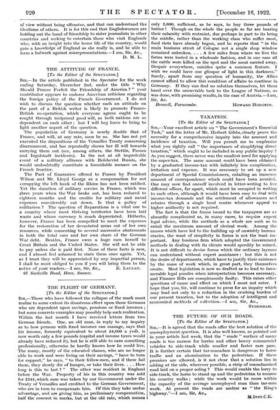THE ATTITUDE OF FRANCE.
[To the Editor of the SPECTATOR.] SIR,—In the article published in the Spectator for the week ending Saturday, December 2nd, under the title "Why Should France Forfeit the Friendship of America ? " your contributor appears to endorse American criticism regarding the foreign policy of the French Government. I do not wish to discuss the question whether such an attitude on the part of a British writer is likely to promote Franco- British co-operation, which everyone agrees ought to be sought through reciprocal good will, as both nations are so dependent on each other ; but I will beg leave to bring to light another aspect of the question.
The population of Germany is nearly double that of France, and will, at any rate, soon be so. She has not yet executed the dispositions of the Versailles Treaty concerning disarmament, and has repeatedly shown her ill will towards carrying them out (see, among others, the Stettin, Passau and Ingolstadt incidents). In the not at all improbable event of a military alliance with Bolshevist Russia, she would undoubtedly constitute a formidable menace on the French frontier.
The Pact of Guarantee offered to France by President Wilson and Mr. Lloyd George as a compensation for not cccupying the left bank of the Rhine has not been ratified. Yet the duration of military service in France, which was three years when the War broke out, has been reduced to eighteen months and the credits for military and naval expenses considerably cut down. Is that a policy of militarism ? The question of Reparations is a vital one to a country whose most thriving territories have been laid waste and whose currency is much depreciated. Hitherto, however, France has been compelled to meet the expenses for the restoration of her devastated areas out of her own resources, while consenting to several successive abatements in both the total sum and her own share of the German War debt. Besides, France owes a huge sum herself to Great Britain and the United States. She will not be able to pay unless she is paid first. None of these facts is new, and I almost feel ashamed to state them once again. Yet, as I trust they will be appreciated by any impartial person, I shall be most obliged to you if you will bring them to the notice of your readers.—I am, Sir, &c., E. LAULAN. 67 Sackville Road, Hove, Sussex.














































 Previous page
Previous page